Nonmetal - Study guides, Class notes & Summaries
Looking for the best study guides, study notes and summaries about Nonmetal? On this page you'll find 675 study documents about Nonmetal.
Page 2 out of 675 results
Sort by
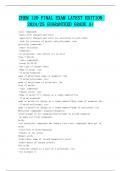
-
CHEM 120 FINAL EXAM LATEST EDITION 2024/25 GUARANTEED GRADE A+
- Exam (elaborations) • 5 pages • 2024
-
- $8.89
- + learn more
ionic compounds -deals with charged particles -oppositely charged particles are attracted to each other -look for presence of metals and polyatomic ions molecular compounds -share electrons -nonmetals -no polyatomic ions unless its an acid Type I metals -ionic compounds -group 1A,2A,3A -one type of charge state -Name of metal +ion -if metal+nonmetal: name of metal+base name of nonmetal +ide -if metal+polyatomic ion: name of metal+name of polyatomic ion Type II metals -ionic com...
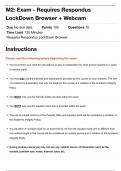
-
CHEM 104 Module 2: Exam (Portage learning)
- Exam (elaborations) • 18 pages • 2023
-
- $21.49
- + learn more
Identify each of the compounds below as ACID, BASE or SALT on the basis of their formula and explain your answer. (1) MgCl (2) HClO (3) Cu(OH) 2 4 2 1.) MgCl2 This is a salt because Mg ( metal) and Cl is a nonmetal 2.) HCIO4 This is a Acid because H infront and Cl is a nonmetal 3) Cu(OH)2 This is a BASE because it has OH and the Cu is a metal MgCl Salt Contains Metal (Mg) + Nonmetal (Cl) HClO Acid Contains H + Polyatomic group (ClO ) Cu(OH) Base Contains Metal (Cu) + OH Polya...
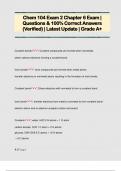
-
Chem 104 Exam 2 Chapter 6 Exam | Questions & 100% Correct Answers (Verified) | Latest Update | Grade A+
- Exam (elaborations) • 20 pages • 2024
-
- $11.49
- + learn more
Covalent bonds: Covalent compounds are formed when nonmetals share valence electrons forming a covalent bond. Ionic bonds: Ionic compounds are formed when metal atoms transfer electrons to nonmetal atoms resulting in the formation of ionic bonds. Covalent bond: Share electrons with nonmetal to form a covalent bond Ionic bond: transfer electrons from metal to nonmetal to form covalent bond - electron donor and an electron acceptor (cation and anion) Covalent: water, H2O 2 H atoms + 1 O ato...
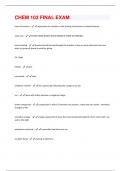
-
CHEM 103 FINAL EXAM QUESTIONS & ANSWERS VERIFIED 100% CORRECT
- Exam (elaborations) • 31 pages • 2024
- Available in package deal
-
- $7.99
- + learn more
Lewis Structures - represents the transfer or the sharing of electrons in chemical bonds octet rule - EVERY ATOM WANTS 8 ELECTRONS IN THEIR OUTERSHELL ionic bonding - chemical bond formed through the transfer of one or more electrons from one atom or group of atoms to another group EX : NaBr metals - give nonmetals - take oxidation number - the superscript indicating the charge on an ion ion - atom with either positive or negative charge binary compound - compounds in which 2 elements a...
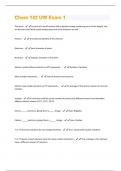
-
Chem 142 UW Exam 1 All Possible Questions and Answers with complete solution
- Exam (elaborations) • 13 pages • 2024
- Available in package deal
-
- $10.19
- + learn more
The atom - Consists of a small nucleus with a positive charge containing most of the weight. Has an electron cloud with mostly empty space but some electrons as well Protons - The chemical identity of the element Electrons - Ionic character of atom Neutrons - Isotopic character of the atom Atomic number (Above element on PT) represents... - Number of protons Mass number represents... - Sum of protons and neutrons Atomic mass (Under element on PT) represents... - An average of the atomic m...
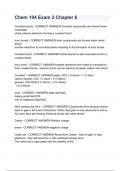
-
Chem 104 Exam 2 Chapter 6 complete solution 2023/2024
- Exam (elaborations) • 13 pages • 2024
-
- $7.99
- + learn more
Covalent bonds - CORRECT ANSWER-Covalent compounds are formed when nonmetals share valence electrons forming a covalent bond. Ionic bonds - CORRECT ANSWER-Ionic compounds are formed when metal atoms transfer electrons to nonmetal atoms resulting in the formation of ionic bonds. Covalent bond - CORRECT ANSWER-Share electrons with nonmetal to form a covalent bond Ionic bond - CORRECT ANSWER-transfer electrons from metal to nonmetal to form covalent bond - electron donor and an electron ac...
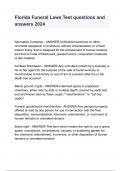
-
Florida Funeral Laws Test questions and answers 2024
- Exam (elaborations) • 42 pages • 2024
-
Available in package deal
-
- $7.99
- + learn more
Florida Funeral Laws Test questions and answers 2024 Alternative Container - ANSWER-Unfinished wood box or other nonmetal receptacle or enclosure, without ornamentation or a fixed interior lining, that is designed for the encasement of human remains and that is made of fiberboard, pressed wood, composition materials, or like material At-Need Solicitation - ANSWER-Any uninvited contact by a licensee or his or her agent for the purpose of the sale of burial services or merchandise to the fam...
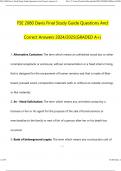
-
Florida Funeral Laws Questions and Answers (100% accurate).
- Exam (elaborations) • 89 pages • 2024
-
- $10.49
- + learn more
Alternative Container - ANSWER-Unfinished wood box or other nonmetal receptacle or enclosure, without ornamentation or a fixed interior lining, that is designed for the encasement of human remains and that is made of fiberboard, pressed wood, composition materials, or like material At-Need Solicitation - ANSWER-Any uninvited contact by a licensee or his or her agent for the purpose of the sale of burial services or merchandise to the family or next of kin of a person after his or her death has o...
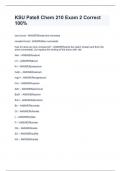
-
KSU Patell Chem 210 Exam 2 Correct 100%
- Exam (elaborations) • 4 pages • 2024
-
Available in package deal
-
- $11.49
- + learn more
ionic bond - ANSWERmetal and nonmetal covalent bond - ANSWERtwo nonmetals how to name an ionic compound? - ANSWERname the cation (metal) and then the anion (nonmetal), but replace the ending of the anion with -ide Na+ - ANSWERsodium Li+ - ANSWERlithium K+ - ANSWERpotassium Ca2+ - ANSWERcalcium mg2+ - ANSWERmagnesium Cs+ - ANSWERcesium Al3+ - ANSWERaluminum Ba2+ - ANSWERbarium Sr2+ - ANSWERstrontium
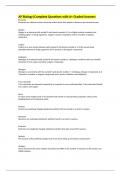
-
AP Biology|Complete Questions with A+ Graded Answers
- Exam (elaborations) • 37 pages • 2024
-
- $13.59
- + learn more
AP Biology|Complete Questions with A+ Graded Answers Elements Elements are substances that cannot be broken down into simpler substances by chemical means. Oxygen Oxygen is an element with symbol O and atomic number 8. It is a highly reactive nonmetal and oxidizing agent. In living organisms, oxygen is used in respiration and in a number of organic molecules. Carbon Carbon is an non mental element with symbol O and atomic number 6. It is the second most abundant element in living o...

$6.50 for your textbook summary multiplied by 100 fellow students... Do the math: that's a lot of money! Don't be a thief of your own wallet and start uploading yours now. Discover all about earning on Stuvia


